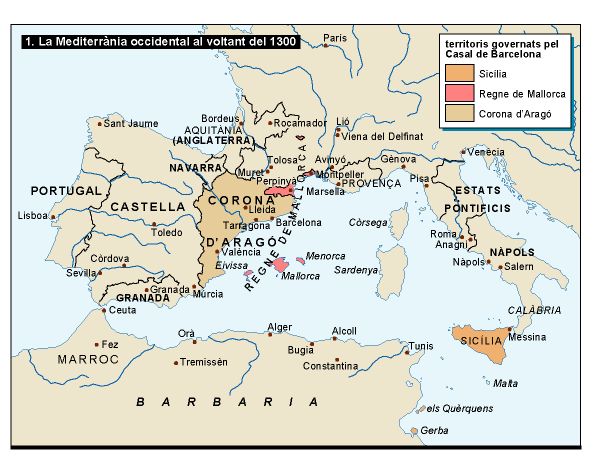- Introduction
- Context
- Life
- Thought
-
Works
- The multilingual nature of Llull's works
- Llull and the catalan language
- Diffusion and preservation
- Book of Contemplation
- Book of the Gentile
- Book of the Order of Chivalry
- Doctrina pueril
- Romance of Evast and Blaquerna
- Book of the Lover and the Beloved
- Ars demonstrativa
- Felix or the Book of Wonders
- Book of the Beasts
- Desconhort
- Tree of Science
- Exemplary Tree
- Cant de Ramon
- Rhetorica nova
- Logica nova
- Liber de fine
- Ars brevis
- Phantasticus
- Ars brevis praedicationis
- Gallery of images
- Database / Dictionary
Majorca
Llull was born in Majorca in 1232 or at the start of 1233, only three years after the island’s conquest by the army of James I. Three decades later, the island remained in a semi-colonial situation. The Christian military conquest of Majorca (in contrast to the acquisition of the territories of Valencia through a series of treaties) lead to the Muslim population’s becoming enslaved, or at least that portion of it which did not have the means to be able to flee at the time of defeat. Even then, after so many years of Christian immigration (mainly Catalan, but also Aragonese, Occitan and Italian), Llull found himself living in an environment in which the Muslim element amounted to approximately a third of the population (the estimates of historians vary between 20 and 50 per cent). Muslims were still slaves, for the most part, but they were beginning to gain their freedom and there were even a few examples of free Muslims carrying out the office of artisans.
In the broadest geopolitical sense, Majorca became a strategic point in mercantile exchanges between North Africa and Europe. So, if we wish to understand the environment in which Llull was formed, we have to rid ourselves of two intuitive images: that of the gulf which has opened in modern times between the Christian and the Islamic worlds and that of the Balearic islands as the Mediterranean holiday paradise for rich and foggy northern Europe, from where it is much easier to travel to Düsseldorf or to Manchester, for example, than to Algiers or Tunis. In the second half of the 13th century, however, Majorca lay right at the centre of the great wheel of businesses in the western Mediterranean, and it kept strong ties intact with North Africa, from which it still had to wait some years before cutting the umbilical cord.
As symbols of that southern Mediterranean calling, there were, on the one hand, colonies of merchants from Pisa, Genoa, Marseilles, and Montpellier as well as of Jewish merchants from North Africa who settled on the island, and, on the other hand, a long series of Majorcan consulships in North Africa.
Source: Anthony Bonner and Lola Badia, Ramon Llull. Vida, pensament i obra literària “Les Naus d’Empúries. Pal Major” 2 (Barcelona: Empúries, 1988), pp. 13-14.
